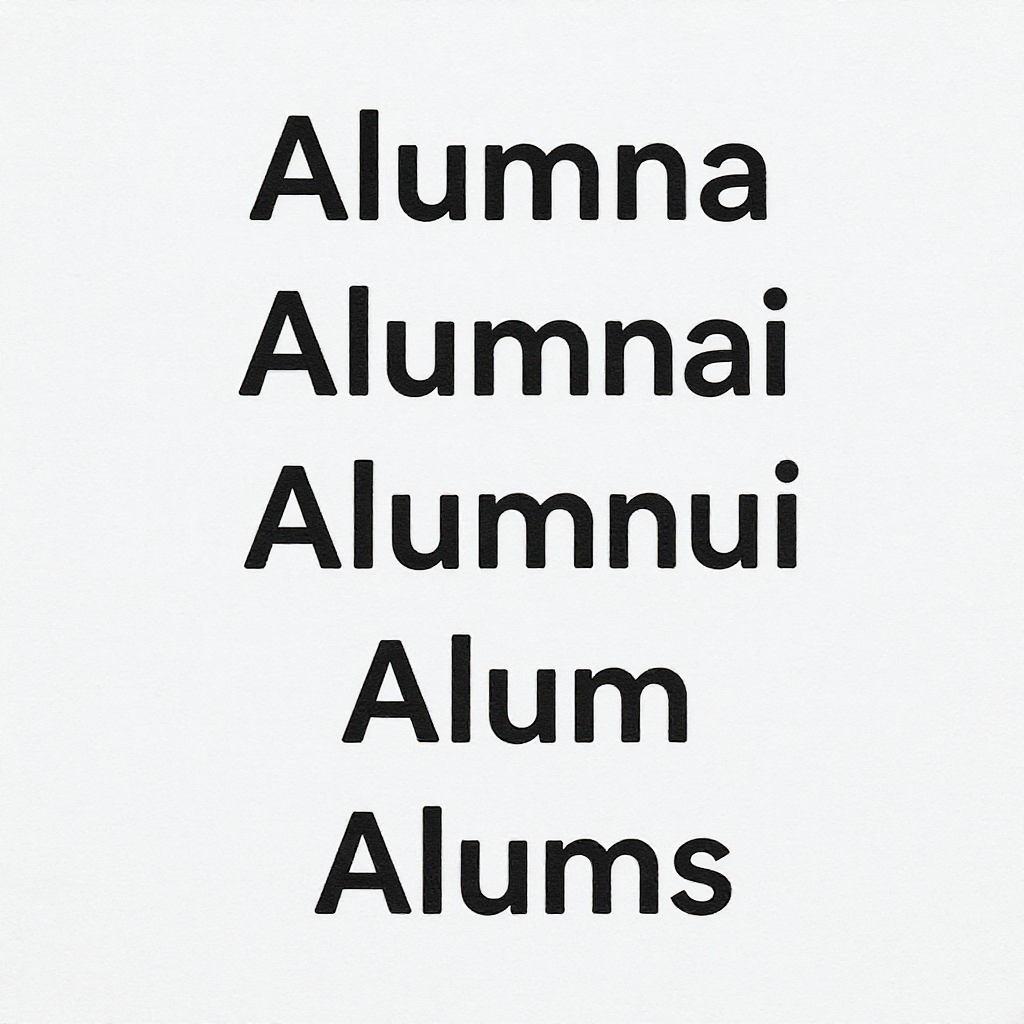“Alumna” Vs “Alumnae” Vs “Alumni” Vs “Alumnus” Vs “Alum” Vs “Alums” – What’s the Difference?

If you’ve ever read a university website or an invitation to a reunion, you’ve probably seen words like alumna, alumnus, alumni, and even alums. Confused? You’re not alone. These words come from Latin, which is why they have unusual endings.
The good news is, Midoo AI will break them down for you with easy rules and examples so you’ll never mix them up again.
Alumnus – A Male Graduate
Alumnus (singular) refers to one male graduate.
Examples:
- He is an alumnus of Harvard.
- My father is an alumnus of the University of Chicago.
- An alumnus gave a generous donation.
👉 Think of -us = usually singular male in Latin.
Alumna – A Female Graduate
Alumna (singular) refers to one female graduate.
Examples:
- She is an alumna of Yale.
- My aunt is an alumna of Stanford.
- The guest speaker, an alumna of our school, shared her story.
👉 The “a” ending often signals female singular in Latin words.
Alumni – A Group of Graduates (Mixed or Male)
Alumni (plural) is used for a group of male graduates or a mixed group of male and female graduates.
Examples:
- The alumni gathered for their 20th reunion.
- Many alumni support their old school.
- The program was created by university alumni.
👉 If there’s even one man in the group, it’s safe to use alumni.
Alumnae – A Group of Female Graduates
Alumnae (plural) is used for a group of only female graduates.
Examples:
- The alumnae of Smith College organized a fundraiser.
- Our school has many successful alumnae.
- The alumnae network is strong and supportive.
👉 This word is less common outside formal contexts but is still correct.
Alum – A Gender-Neutral, Informal Option
Alum is a modern, informal, and gender-neutral word. It refers to a single graduate of any gender.
Examples:
- She’s an alum of MIT.
- He’s an alum of Princeton.
- I met an alum from my old college today.
👉 Useful if you don’t want to worry about gender-specific terms.
Alums – Plural of Alum
Alums is the informal plural form of alum. It’s used for groups of graduates of any gender.
Examples:
- The alums returned for homecoming weekend.
- Two alums started a successful company.
- The event was open to all alums of the program.
👉 Very common in casual writing, newsletters, and conversations.
Quick Reference Table
| Word | Number | Gender | Example Sentence |
|---|---|---|---|
| Alumnus | Singular | Male | He is an alumnus of Harvard. |
| Alumna | Singular | Female | She is an alumna of Yale. |
| Alumni | Plural | Male or Mixed | The alumni gathered for a reunion. |
| Alumnae | Plural | Female only | The alumnae hosted an event. |
| Alum | Singular | Any gender (informal) | She’s an alum of MIT. |
| Alums | Plural | Any gender (informal) | The alums launched a project. |
Memory Tricks
- us → male singular (alumnus)
- a → female singular (alumna)
- i → male or mixed plural (alumni)
- ae → female plural (alumnae)
- Alum/Alums → modern, gender-neutral, easy.
FAQs
Do I have to use the Latin forms (alumnus, alumna, etc.)?
Not always. In formal writing (like official school announcements), they’re still common. But in everyday English, alum and alums are widely accepted.
Is “alumni” correct for women?
If it’s a mixed group, yes. But if you’re talking about only women, the technically correct word is alumnae.
Which word is most common today?
“Alumni” (formal plural) and “alum”/“alums” (informal) are the most common.
Can “alumnus” or “alumna” also mean former member, not just graduate?
Yes. They can also mean a former member of an organization, not just a school.
Should I use alum or alumni in business writing?
If the tone is formal, use alumnus/alumna/alumni. If it’s casual or for social media, alum/alums works perfectly.
Final Thoughts
The family of words — alumnus, alumna, alumni, alumnae, alum, alums — may look intimidating, but the rules are actually simple. Use the Latin forms in formal or traditional contexts, and go with alum/alums for modern, gender-neutral writing.
Midoo AI suggests practicing by writing sentences with each form. Soon you’ll be able to choose the right word naturally, whether you’re writing a graduation card, an email, or a blog post.